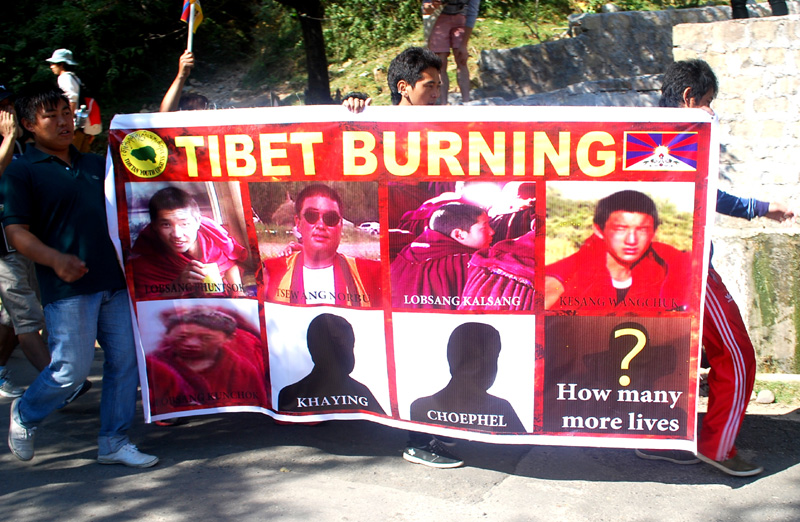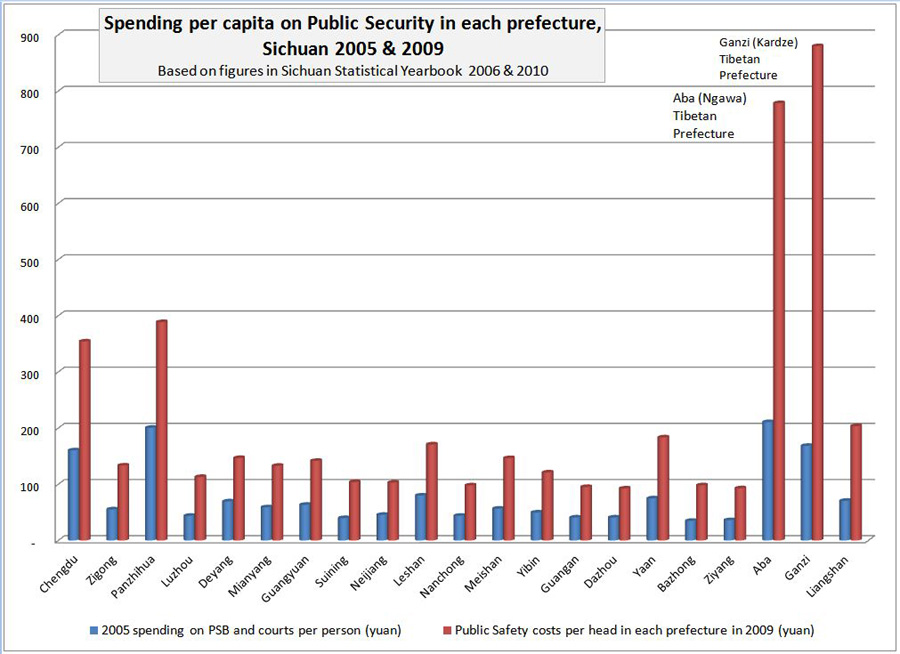 Dharamshala: The rise in anti-Chinese tensions and protests in Ngaba county, western China, including a recent wave of self-immolations, has occurred amid massive increases in security expenditure for the region, a report from Human Rights Watch says.
Dharamshala: The rise in anti-Chinese tensions and protests in Ngaba county, western China, including a recent wave of self-immolations, has occurred amid massive increases in security expenditure for the region, a report from Human Rights Watch says.
Security expenditure in Ngaba county has increased sharply since 2002, Human Rights Watch revealed. This is despite no significant reports of unrest until 2008.
The report suggests that the increase in government spending on security has contributed to provocative policing techniques such as monastery blockades and the mass detentions of monks which has exacerbated local discontent and unrest.
Since anti-Chinese riots broke out in 2008, the Chinese government has imposed drastic restrictions on Tibetan monasteries both in Ngaba county and other regions in Tibet. These measures include brutal security raids, arbitrary detentions of monks, increased surveillance within monasteries, and a permanent police presence inside monasteries to monitor religious activities.
"Security measures designed to curtail the right to free expression, association, and religious belief in Tibetan monasteries are not legitimate" said Sophie Richardson, China director at Human Rights Watch.
Repressive security crackdowns have been linked to the recent wave of protests in which young Tibetans have self-immolated to try and bring attention to the deteriorating situation in Ngaba. October 7 saw the latest of these when two former monks, Khaying 18 and Choepel 19, set themselves on fire.
The response to each of the self-immolations has been to punish Kirti monastery and the local community through arrests, police raids, roadblocks, and displays of force by the Chinese police. These measures are merely "exacerbating the tensions, ...the [Chinese] government should address the region's underlying grievances" says Richardson.
Following the first immolation in March, armed personnel surrounded the monastery and cut off its access to food and water for several days. 'Patriotic education' campaigns have also been instigated in response to the unrest. On April 21, more than 300 monks were taken away from Kirti monastery in military trucks and detained in unspecified locations to undergo several weeks of political indoctrination. Only some have returned.
According to Human Rights Watch, there are approximately 2000 fewer monks living at Kirti monastery now compared with the number of residents living there in March. Stringent controls have been placed on the monastery and on the movements of the monks, including the requirement that any monk leaving monastery grounds obtain letters from three separate guarantors.
In addition to these measures, the government sentenced three Kirti monks accused of having aided Phuntsok in setting himself on fire in March this year. The heavy prison sentences - 10, 11, and 13 years - were widely perceived as unjustified. Two weeks later, several other monks from Kirti were sentenced to 2-and-a-half or 3 years of 're-education through labor,' also on suspicion of involvement in the March 16 protest by Phuntsok.
No credible evidence has emerged so far to suggest that the monastery authorities or its other members were involved in inciting or aiding those who self-immolated.
China has accused both the monastery and the Dalai Lama for inciting the self-immolations.
The six self-immolations in Ngaba county this year coincide with a significant increase in spending on security in the area, according to government statistics examined by Human Rights Watch. Those show a dramatic increase in public security spending in Tibetan areas of Sichuan province, specifically Ngaba and Kardze prefectures, since at least 2002, with a more rapid increase after 2006. In 2007, a new "anti-terrorist" unit was established in Ngaba to "strike hard" against "violent terrorist activities."
 By 2009, per capita annual spending on public security, which covers the civilian police force, the People's Armed Police, and costs associated with running the local courts and prisons, in Ngaba was five times the average spent per person on public security in non-Tibetan prefectures in Sichuan, and over twice the amount spent for security in the provincial capital, Chengdu.
By 2009, per capita annual spending on public security, which covers the civilian police force, the People's Armed Police, and costs associated with running the local courts and prisons, in Ngaba was five times the average spent per person on public security in non-Tibetan prefectures in Sichuan, and over twice the amount spent for security in the provincial capital, Chengdu.
Increased security expenditure does not seem to have silenced discontent in Ngaba. "Recent developments in and around Kirti monastery show the terrible human cost of ongoing repression," Richardson said. "Clearly the Chinese government can't spend its way out of this problem - genuine stability is the result of protecting, not denying people their rights."
Official Chinese news outlets have tried to play down the immolation incidents, claiming that they are being used by the Tibetans' spiritual leader, the Dalai Lama, for political gains. None of the official commentary on the immolations has acknowledged the Tibetans' grievances.
Moreover, the Chinese government this week accused Dalai Lama supporters of inciting self-immolation. "They publicly played it up, spread rumors and incited more people to follow suit," Foreign Ministry spokesman, Liu Weimin, told reporters at a daily news briefing in Beijing.
On Wednesday, the parliament and the cabinet of the Tibetan government in exile, based in Dharamsala, India, released a statement expressing deep concern over what it called the deteriorating situation in Tibet. The statement said: "We express our solidarity with all those who lost their lives and with all other Tibetans who are incarcerated for their courage to speak up for the rights of the Tibetan people."


![Tibet has a rich history as a sovereign nation until the 1950s when it was invaded by China. [Photo: File]](/images/stories/Pics-2024/March/Tibet-Nation-1940s.jpg#joomlaImage://local-images/stories/Pics-2024/March/Tibet-Nation-1940s.jpg?width=1489&height=878)















